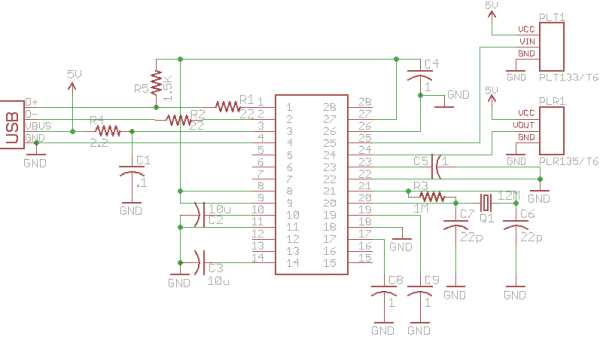When S/PDIF became available in the Teensy Audio Library I thought this might be the solution to ground loop problems I’d been having when interfacing projects to my PC. However, I quickly realized I didn’t have any sound cards with an S/PDIF interface.
In the belief that I’d rather build than buy I decided to update one of my previous projects, a PCM2904 based sound card, to include an S/PDIF interface. The update was a cinch because TI has a pin-for-pin replacement for the PCM2904 (the PCM2906) with an S/PDIF interface. All I had to do was replace the audio jacks with fiber-optic transmitter/receivers connected to the appropriate pins.
The resulting schematic and prototype are shown below. (If you’re interested, the boards are available through OSH Park)
There’s not a lot to it. It’s simply the reference circuit from the PCM2906 data sheet with portions I don’t expect to use eliminated.
Testing The Interface
To test the interface I looped the transmitted fiber optic signal back to the receiver. When plugged into my Linux laptop it registered as a Texas Instruments PCM2906C Audio Codec as shown below.
Bus 004 Device 003: ID 058f:6366 Alcor Micro Corp. Multi Flash Reader Bus 004 Device 002: ID 8087:0024 Intel Corp. Integrated Rate Matching Hub Bus 004 Device 001: ID 1d6b:0002 Linux Foundation 2.0 root hub Bus 003 Device 004: ID 1bcf:2c02 Sunplus Innovation Technology Inc. Bus 003 Device 003: ID 413c:3016 Dell Computer Corp. Optical 5-Button Wheel Mouse Bus 003 Device 002: ID 8087:0024 Intel Corp. Integrated Rate Matching Hub Bus 003 Device 001: ID 1d6b:0002 Linux Foundation 2.0 root hub Bus 002 Device 001: ID 1d6b:0003 Linux Foundation 3.0 root hub Bus 001 Device 013: ID 08bb:29c6 Texas Instruments PCM2906C Audio CODEC Bus 001 Device 001: ID 1d6b:0002 Linux Foundation 2.0 root hub
Starting up the PulseAudio Volume Control and playing back a file using VLC, I could see the input and output audio levels varying with the signal from VLC.
If you want to actually hear the looped back audio you can use the PulseAudio loopback module.
For more detail: An S/PDIF Sound Card Using The PCM2906

